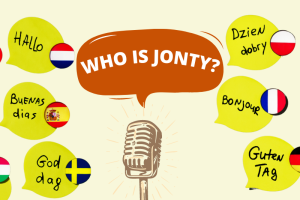Do you dread learning grammar as you start a new language?
If so, I have good news for you.
In fact, it can slow you down, or even take you off course. I’ve seen many a student hit the grammar wall and quit a language that had been giving them pleasure. Don’t let that happen to you.
Here’s the truth: You can learn a new language without studying grammar.
This fact defies language instructors (and students) around the world. Grammar is a fancy word to describe the rules that govern a language. While this is a simple definition, it’s not completely accurate.
The reality is that grammar is a set of observations academics write down when documenting a language. Those patterns are generated by native speakers of the language – whose minds, like everyone’s minds, rarely follow set patterns.
You Don’t Need Grammar in Language Learning
Many people are unwilling to accept that grammar isn’t necessary at first. They fight against it. Traditional language teachers are probably the worst culprits. Most believe you can’t learn a language without studying grammar first. Reality disagrees.
Education departments across the world all focus on grammar instruction. However, students still fail in learning how to speak languages fluently. In many cases, the very reason so many students struggle to speak languages at the most basic level is that they believe learning grammar is a requirement for speaking a language proficiently. They’re wrong, and they’re studying grammar wrong.
How Learn Grammar Naturally
Grammar study is not how you learned your native language. While native speakers of a language typically converse “according to grammatical rules”, few of them are consciously aware of the rules they’re using. And sometimes, the rules don’t even matter. That’s because there are so many exceptions.
French is an excellent example. With each rule you learn in French, it’s necessary to learn the many exceptions. This means you cannot just think about the rules when you are speaking a new language, because you also have to wonder if there is an exception.

Imagine that you’re considering the rules and exceptions while having a discussion with a friend. By the time you consider all the ways you can construct a sentence, your companion will be in the middle of playing his third or fourth game on his cell phone.
The fact is, you didn’t learn to speak your native language by studying grammar. You weren’t taught grammar until you went to school, and by then, you were already speaking your native language like a pro. You didn’t know what a verb was or how to conjugate it. However, you knew verbs and you could conjugate them just the same. As a matter of fact, you began to speak complete, grammatically correct sentences by the time you were about two or three years old.
Children Acquire Languages Without Grammar
Many parents have observed language acquisition firsthand. First, their children begin to babble incoherently. Second, they begin to say just one word. Often, they repeat a word that someone said to them. Then they create short sentences of two or three words. Next, they construct complex but grammatically incorrect sentences. Lastly, they develop the ability to speak with correct sentences.

The process described above occurs even though the child has never read a book on grammar. It happens because she is listening to the native speakers around her. She also has help from the adults who correct her language when she makes mistakes. And children make a lot of mistakes when they are learning a language…
Here’s an example of children communicating without grammar:
The child says, “Gimme dat one.”
The parent responds, “Do you want that one?”
The child says, “Yeah, dat one.”
Children learn languages by listening to the sound patterns they hear throughout the day and then repeating them. It starts with one word, naming objects around them. Then, it moves on to short, simple sentences. As they grow, children repeat the words they hear, and they repeat how they sound to them. They eventually perfect the pronunciation of speech after they have heard the words countless times.
Adults Can Reach Fluency Without Grammar
It is useful to observe how children learn their first languages so that we can imitate the process they use. After all, they seem to learn language without any difficulties at all. If children can learn language in the fashion described above, why can’t adults?
I must acknowledge the fact that learning a second language can be quite different from learning a first language; some people believe the two should not be compared. It can be harder for an adult to learn a second language because their native language may interfere with the ability to learn the second, but adults also enjoy a number of advantages.
For instance, an adult already knows how to study, and this helps during language instruction. I’ve written previously about the differences between learning and studying a language, so you know I’m not a huge fan of the latter. But there is a place for studying in every adult’s language learning activities. That said, learning grammar rules first is not a good approach.
How to Learn Grammar By Listening

Learning a language is like learning any other skill. You must combine practice and study. Let’s take learning to play a musical instrument as an example. If you were to learn to play an instrument like educators teach children grammar rules, you would study music theory without ever touching an instrument. But that would make no sense.
You can only improve a skill through practice. So, when it comes to learning a musical instrument theory and hands-on application go hand-in-hand. Sadly, this is rarely the case when it comes to language learning in most academic classroom settings. Students are often taught formal grammar before they have dug into the basic expressions necessary to engage in a language and benefit from native speakers.
Language instruction can be done differently. But, it requires us to apply a new technique. It’ll be important for you to notice the grammatical expressions and the specific ways native speakers speak. Then it’ll be your turn to take those expressions and incorporate them into your own use of the language and in your writing.
Many people do this naturally and instinctively, yet so few formal language programs nurture or promote this approach. This is why so many language learners fail to become fluent in a new language.
Should You Avoid Grammar Completely?
Grammar has a limited role in language instruction. Grammar instruction often involves successfully completing lessons, but this does not necessarily mean the student can speak or write the language correctly and coherently.
You’ll be able to write and speak in a new language with proficiency if you practice imitating the words and expressions you hear from native speakers. The study of grammar is not necessary to make this happen. Grammar only clarifies the rules you are learning by listening.
Phrasebooks are extremely useful tools for someone learning a new language. These books contain examples of dialogue real people have said, and they are a great investment. Any resource that gives the reader or the listener examples of spoken language is much better for learning than a book focusing on grammar.
When I am learning a language, I typically don’t worry much about grammar. I listen to how native speakers form their sentences and try to say my sentences in the same way. If you spend your time focusing on one sentence at a time, you’ll learn the grammar (and new vocabulary words) in a much more enjoyable manner.







